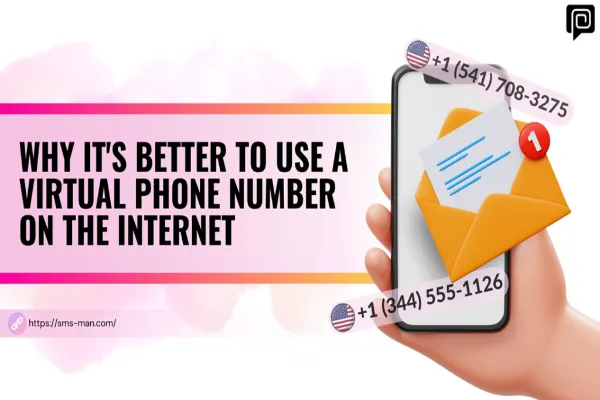WHY IT’S BETTER TO USE A VIRTUAL NUMBER ON THE INTERNET

A cell phone number is a piece of personal information about a person. It’s no secret that publishing your personal number on the Internet can lead to unfortunate consequences. Attackers get hold of your mobile number and can easily use it for personal gain.
In this age of technology, your phone number is needed to perform almost any action on the Internet. For example, to create an account in messenger, social networks, banking applications and other services. Also, often when the number serves as a way to change passwords, confirm your identity and connect the two-factor authentication in mobile applications and sites.

Most typically, large platforms (especially those related to financial information and banking transactions) have a sufficiently high level of security and follow the strictest privacy rules for their users. However, less popular sites and services cannot boast of such protection, and they are the ones you need to be especially careful with.
In this article we will tell you why you shouldn’t “publish” your number on the Internet unnecessarily and how it can be dangerous. We’ll also tell you about the ways to keep your personal number secret while registering with different resources.
The main reasons not to use your personal number on the Internet
- Spam and advertising calls. The most harmless thing you can do with publishing your mobile number on the Internet is to receive spam calls from various companies. It’s no secret that many services that collect cell phone numbers for mailing lists or registration sell databases of their customers to third parties. As a result, users whose numbers have been “leaked” start receiving calls with advertisements or other spam from dentists, banks, mobile operators, etc. Often bases are sold several times, so different organizations may call. It is difficult to get rid of such calls with a blacklist because spammers use many numbers and may change them.
- Fraud. Along with spammers, users can also be attacked by scam calls. If you have specified your mobile number, full name, age and other personal data when registering on the Internet, these can be used by fraudsters. For example, they introduce themselves as employees of banks or government agencies, and then call the subscriber’s full name to give weight to their words. The victim hearing his/her name may get confused and lose vigilance, which is what the fraudsters take advantage of. Other fraudulent actions may be performed through a phone number. The most trivial is an SMS sending on behalf of family members asking them to transfer money to a phone number or card account. If the number belongs to elderly people who have children they may transfer the money immediately without knowing who sent the SMS.
- Search by number. The number itself is only part of the personal information about the user, but it often comes with other data. For example, if the number is listed on a social networking page, anyone can use it to find the account of its owner. As a result, unauthorized people can find out a person’s name, social status, relatives (many people list them in social networks with a link to their accounts, too), presumable financial situation, etc. If a user has geolocation enabled, his location, home address, or vacation spot will also become known. This data can easily be used by fraudsters for blackmail and deception.
Therefore, users are recommended to adhere to several rules, so as not to become a victim of spammers and fraudsters:
- If when registering at any resource it is not necessary to specify your number, or it can be replaced by the e-mail address, you should choose the second option or not to advertise the number at all.
- It’s not a good idea to leave your number on a page in social networks, so that the user’s account can’t be tracked by the number.
- If you often have to leave your number in the public domain (e.g., to post sales ads, register accounts, etc.), it is recommended to get a “fake number for verification” which you can get online.
What is a fake number and how to get it?
If previously to register on a site, forum or online store it was enough to enter an email address, today you need a phone number. Account verification is done via a short SMS-code.
Fake phone number for SMS is an online service, which allows you to get an anonymous virtual number to receive text messages and registration on various resources. Such phone numbers are completely anonymous and there is no need to go to a mobile phone shop and apply for a new SIM card.
How to get a fake phone number for online registrations?
Let’s look at the instructions on how to get a fake phone number. Let’s look at how to do it using popular SMS verification service:
- First, we go to the service SMS-man, where you need to register. Specify your email and enter the password to create a new account.
- The next task is to replenish your personal account. We go to “Replenish balance” and deposit money by any convenient way, from the proposed options.
- On the main page you have to set filters. Choose the country of the virtual number.
- After that you need to specify the service, where you need to specify the mobile number for registration.
- Press “Buy”, after that virtual number will be automatically added to your personal cabinet.
Now you can use this number for registration. All incoming SMS will be displayed in the “History”, which is located on the main page.







